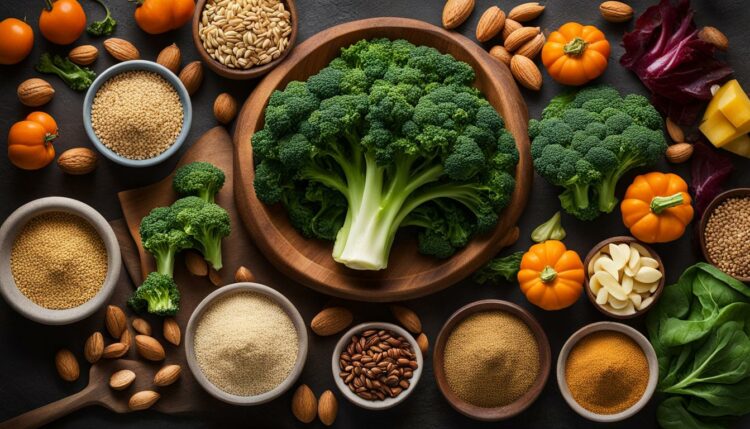Magnesium is an essential mineral that plays a vital role in various bodily functions, including nerve and muscle function, immune system support, blood pressure regulation, and bone health.
Unfortunately, many people do not consume enough magnesium in their daily diet. To ensure optimal health and nutrient intake, it is important to incorporate magnesium-rich foods into your diet. Here are 10 top sources of magnesium that you should include in your daily meals:
Key Takeaways:
- Incorporating magnesium-rich foods into your diet is important for overall health and well-being.
- Dark chocolate is a delicious source of magnesium, with added benefits of antioxidants and heart health support.
- Avocados are not only creamy and flavorful but also provide a significant amount of magnesium, along with heart-healthy fats and fiber.
- Nuts, such as almonds and cashews, are not only a tasty snack but also rich in magnesium and fiber.
- Leafy greens, like spinach and kale, are nutrient powerhouses that offer abundant magnesium, along with other essential vitamins and minerals.
Dark Chocolate: A Delicious Source of Magnesium
Dark chocolate is not only a delectable treat but also a rich source of magnesium. With approximately 65 mg of magnesium per 1-ounce (28 gram) serving, dark chocolate provides about 15% of the recommended daily value.
It is also packed with antioxidants that help neutralize harmful free radicals and promote overall health. These antioxidants, such as flavonoids and polyphenols, have been linked to various health benefits, including protection against chronic diseases like heart disease.
“Dark chocolate is not only a delicious indulgence but also a convenient way to boost your magnesium intake.”
**Here are some key highlights of dark chocolate’s benefits:
- Heart Health: Research suggests that the antioxidants in dark chocolate may help reduce the risk of heart disease by improving blood flow, reducing blood clotting, and reducing inflammation. Dark chocolate may also help prevent the oxidation of LDL cholesterol, which can lead to the formation of plaque in the arteries.
- Antioxidant Power: Dark chocolate is loaded with antioxidants that help protect cells from damage caused by free radicals. These antioxidants can help boost the immune system and reduce the risk of chronic diseases, including certain types of cancer.
- Mood Booster: Dark chocolate contains serotonin, a neurotransmitter that plays a role in mood regulation. Consuming dark chocolate may help increase serotonin levels in the brain, promoting feelings of happiness and well-being.
“Indulging in a small serving of dark chocolate can not only satisfy your sweet tooth but also provide your body with essential minerals and antioxidants.”
It is important to note that not all chocolate varieties are created equal. To reap the maximum health benefits, it is recommended to choose dark chocolate with a high percentage of cocoa solids, typically 70% or higher. This ensures a higher magnesium content and lower sugar and milk content.
“When selecting dark chocolate, opt for those with minimal additional ingredients to enjoy the full benefits of this tasty and nutritious treat.”

| Dark Chocolate Brands | Magnesium Content per 1-ounce (28 gram) serving |
|---|---|
| Ghirardelli Intense Dark 72% | 95 mg |
| Lindt Excellence 85% | 96 mg |
| Green & Black’s Dark Chocolate 85% | 95 mg |
| Endangered Species Natural Dark Chocolate 88% | 99 mg |
| Alter Eco Dark Blackout Organic Chocolate 85% | 98 mg |
Avocados: Creamy and Nutrient-Dense
Avocados are not only delicious but also an excellent source of magnesium. One medium avocado contains approximately 58 mg of magnesium, providing 14% of the daily recommended intake.
Avocados also boast heart-healthy monounsaturated fats, which can help improve cholesterol levels and promote cardiovascular health. Additionally, avocados are an abundant source of fiber, contributing to digestive health and promoting feelings of fullness after meals.

Did you know? Avocados are technically a fruit and belong to the same family as cinnamon and bay leaves! This versatile fruit has a smooth and creamy texture, making it a perfect addition to salads, sandwiches, and dips.
Why Choose Avocados?
- High Magnesium Content: Avocados contain a significant amount of magnesium, which is essential for various bodily functions, including nerve and muscle function, energy production, and DNA synthesis.
- Heart-Healthy Fats: The monounsaturated fats found in avocados can help lower LDL cholesterol levels and reduce the risk of heart disease.
- Fiber-Rich: Avocados are an excellent source of dietary fiber, promoting digestive health, regulating blood sugar levels, and aiding in weight management.
- Packed with Nutrients: In addition to magnesium, avocados are rich in vitamins C, E, K, and B vitamins, as well as potassium and folate.
“Avocados are a powerhouse of nutrients, offering an array of health benefits. From promoting heart health to supporting digestion, incorporating avocados into your diet is a delicious way to nourish your body.”
Nuts: A Magnesium-Rich Snack
Nuts are not only a tasty and convenient snack, but they are also packed with important nutrients, including magnesium. Magnesium is an essential mineral that plays a crucial role in various bodily functions, such as nerve and muscle function, maintaining a healthy immune system, regulating blood pressure, and promoting bone health.
When it comes to magnesium content, nuts are an excellent choice. Popular nuts like almonds, cashews, and Brazil nuts are known for their rich magnesium content. For example, a 1-ounce (28 gram) serving of cashews contains approximately 83 mg of magnesium, which provides about 20% of the daily recommended intake.
In addition to their magnesium content, nuts also offer other significant health benefits. They are high in fiber, which promotes healthy digestion and contributes to feelings of fullness after meals.
Furthermore, studies have shown that including nuts in your diet may have positive effects on heart health. Nuts have been associated with improved blood sugar and cholesterol levels, which are essential factors in maintaining a healthy heart.
When it comes to nut selection, it’s important to remember that different nuts have varying levels of magnesium. Here is a table outlining the magnesium content and other nutritional information for some common nuts:
| Nut | Magnesium Content (per 1-ounce/28g serving) | Fiber Content (per 1-ounce/28g serving) |
|---|---|---|
| Almonds | 76 mg | 3.5 grams |
| Cashews | 83 mg | 1 gram |
| Brazil Nuts | 107 mg | 2 grams |
As you can see, these nuts are not only delicious but also rich in magnesium and fiber, making them a smart choice for snacking. So the next time you’re feeling hungry, reach for a handful of nuts to satisfy your tastebuds and boost your magnesium intake.
Leafy Greens: Nutrient Powerhouses
Leafy greens, such as kale, spinach, collard greens, turnip greens, and mustard greens, are not only tasty additions to your meals but also packed with essential nutrients.
These leafy vegetables are excellent sources of magnesium, with one cup of cooked spinach containing approximately 158 mg of magnesium. This amount provides 37% of the daily recommended intake, making leafy greens an excellent choice for meeting your magnesium needs.
But the benefits of leafy greens don’t stop at magnesium. They are also rich in other important nutrients such as iron, manganese, and vitamins A, C, and K.
These nutrients contribute to overall health and well-being, supporting functions like immune system functioning, maintaining strong bones, and promoting healthy blood cells.
What sets leafy greens apart is their extraordinary nutrient density. They offer a high concentration of vitamins, minerals, and antioxidants per calorie, making them a great addition to any balanced diet.
Antioxidants, found in abundance in leafy greens, play a crucial role in protecting cells from damage caused by harmful free radicals. Furthermore, the antioxidant properties of leafy greens have been associated with a reduced risk of certain cancers, making them a valuable addition to cancer-preventive eating patterns.
FAQ
What is magnesium and why is it important?
Magnesium is an essential mineral that plays a vital role in various bodily functions, including nerve and muscle function, immune system support, blood pressure regulation, and bone health. It is important for maintaining optimal health and overall well-being.
What are some top sources of magnesium?
Some of the top sources of magnesium include dark chocolate, avocados, nuts, and leafy greens. These foods are not only delicious but also provide significant amounts of magnesium to support your daily nutrient intake.
How much magnesium should I consume daily?
The recommended daily intake of magnesium varies based on factors such as age, sex, and overall health. However, for most adults, the recommended daily intake is around 310-420 mg for males and 255-320 mg for females.
Are there any other health benefits of magnesium-rich foods?
Yes, magnesium-rich foods offer additional health benefits. They are often packed with other essential nutrients, such as antioxidants, heart-healthy fats, and fiber. These foods can help improve cholesterol levels, promote cardiovascular health, support digestive health, and provide protection against certain diseases.
Can I consume too much magnesium?
While magnesium is generally safe when obtained from food sources, excessive consumption of magnesium supplements can lead to adverse effects, such as diarrhea, nausea, and stomach cramps. It is best to consult with a healthcare professional to determine the appropriate magnesium intake for your specific needs.




